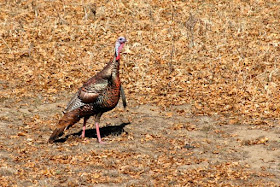I remember being taught that "history is written by the victors," or something to that effect. Now, as with many things I was sure of when I was younger, I find the absolute truth of that dictum to be proven questionable, or the definition of "victors" has become as much a movable feast as Thanksgiving seems headed for. Here's what I learned about Thanksgiving by looking at today's Internet coverage. First is this article in today's the guardian:
"...Even the Plimoth Plantation, a recreation of a 17th-century Pilgrim village, acknowledges the claims of places in Florida, Maine and Virginia as well as Texas – which has a second contender dating back to 23 May 1541.
Not that any of them contribute to our understanding of why Americans are about to devour turkey, watch football and attend parades, as James W Baker wrote in his book, Thanksgiving: The Biography of an American Holiday.
“Each was technically a ‘thanksgiving,’ and each occurred before Plymouth Colony was founded in 1620,” he wrote. “But these claims were essentially irrelevant, as each was an isolated instance that had no connection with, or influence on, the future American holiday.”
Meleagris gallopavo, wild turkey
Photo by J. Harrington
As a counter to that perspective, some? many? most? all? Native Americans have an understandably different view, like this one published in Native News Online:
The first “official” Day of Thanksgiving was held in 1637, when Governor John Winthrop called for a day of thanks following the massacre of more than 700 men, women and children from the Pequot Tribe. This massacre took place in Mystic, Connecticut, during the tribe’s Green Corn Festival. While tribal members slept, men from the Massachusetts Bay Colony crept into their camp. After tribal members had laid down their weapons, the colonists killed the men, burned the women and children in their dwellings and sold the rest into slavery. When they returned, Governor Winthrop called for an official day of Thanksgiving to celebrate their success. This event marks the beginning of a holocaust that lasted for centuries on this land, leading to the slaughter of millions of Indigenous peoples. This factual history contains countless acts of genocide that have continued into the modern day. This is why Indigenous people, and many of our friends and allies, recognize this day as a National Day of Mourning. This day of mourning is not just for the tragic events of the past, it is also for the ongoing suffering that our people continue to endure.All of this makes me thankful that I live in Minnesota, where there's the bdote memory map as well as the "Healing Place". What I wish George Santayana had written is "Those who never learned the past are condemned to repeat it." We cannot remember what we have never had an opportunity to learn. Clearly, we haven't yet learned enough about working together. That's something we'll have to be thankful for on some future thanksgiving day. Meanwhile, why not reach out and share good food, warmth and love with family, friends and those who need it on this Thanksgiving Day.
One Home
Mine was a Midwest home—you can keep your world.Plain black hats rode the thoughts that made our code.We sang hymns in the house; the roof was near God.
The light bulb that hung in the pantry made a wan light,but we could read by it the names of preserves—outside, the buffalo grass, and the wind in the night.
A wildcat sprang at Grandpa on the Fourth of Julywhen he was cutting plum bushes for fuel,before Indians pulled the West over the edge of the sky.
To anyone who looked at us we said, “My friend”;liking the cut of a thought, we could say “Hello.”(But plain black hats rode the thoughts that made our code.)
The sun was over our town; it was like a blade.Kicking cottonwood leaves we ran toward storms.Wherever we looked the land would hold us up.
********************************************
Thanks for visiting. Come again when you can.
Please be kind to each other while you can.

No comments:
Post a Comment